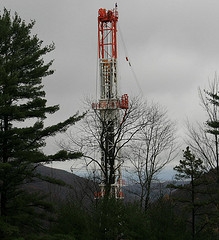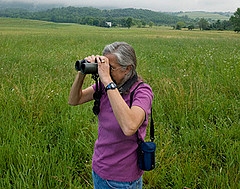Penn State Extension – Natural Gas
Natural Gas < http://extension.psu.edu/naturalgas >
Marcellus shale has the potential to affect many parts of Pennsylvania. Since 2001, we have been actively helping citizens, landowners, businesses, local governments, and others understand the opportunities and challenges arising from Marcellus shale. Let us help you, too.
Webinars < http://extension.psu.edu/naturalgas/webinars/ >
This series includes the upcoming webinar schedule, and the recorded webinars and related materials.
Webinar to look at the impacts of Marcellus gas play on Pa. forestland
live.psu.edu/story/56772#nw69
Friday, December 9, 2011
UNIVERSITY PARK, Pa. — A Web-based seminar sponsored by Penn State Extension and the College of Agricultural Sciences will examine how Marcellus Shale natural-gas development is affecting forestland in Pennsylvania.
The 75-minute webinar will begin at 1 p.m. on Dec. 15. Presenters will be Ellen Shultzabarger, chief of the Forest Resources Planning Section of the Pennsylvania Department of Conservation and Natural Resources, and Tony Quadro, forester and assistant district manager for the Westmoreland County Conservation District.
“We’ll cover the impacts of gas activity on state forestlands and what we’ve done to reduce and minimize the effects of the Marcellus play on our forests,” Shultzabarger said. “Avoid, minimize, mitigate and monitor — that’s our approach.”
Shultzabarger said the session will highlight the policies and management practices the department follows to decrease the fragmentation and impact to state forestlands. “We’ll also discuss the lessons we have learned and practices we recommend for use in communities and on private lands.”
Quadro will focus on the impacts of Marcellus gas drilling on private forestlands and the issues affecting private forestland owners.
“The main topics of discussion will include factors that will impact your forest- management plan, such as the siting of pads, pipelines, waterlines and access roads on your property,” he said.
“I also will cover expectations for payment for standing timber, services of a professional consulting forester, Clean and Green Law status, timing of timber harvests, selling logs, and Marcellus gas development’s longterm impacts on private forestland.”
The webinar is part of a monthly series of online workshops addressing opportunities and challenges related to the state’s Marcellus Shale gas boom. Information about how to register for the session is available on the webinar page of Penn State Extension’s natural-gas website at http://extension.psu.edu/naturalgas/webinars.
Future webinars will center on seismic testing, transportation patterns and impacts from Marcellus development, and municipalities’ roles related to water use and protection.”
Previous webinars, publications and information on topics such as air pollution from gas development; the gas boom’s effect on landfills; water use and quality; zoning; gas-leasing considerations for landowners; implications for local communities; gas pipelines and right-of-way issues; and legal issues surrounding gas development also are available on the Penn State Extension natural-gas website (http://extension.psu.edu/naturalgas).
For more information, contact John Turack, extension educator based in Westmoreland County, at 724-837-1402 or by email at jdt15@psu.edu.
Marcellus natural-gas presentation focuses on municipal experiences
live.psu.edu/story/56458#nw69
Friday, November 18, 2011
UNIVERSITY PARK, Pa. — A presentation detailing how municipal governments are dealing with the
Marcellus Shale natural-gas boom will be offered by Penn State Extension from 6:30 p.m. to 9 p.m. on Dec. 6.
“Marcellus Shale Development: The Pa. Municipal Experience to Date and Possibilities for the Future” will provide a venue for officials to share their breadth of experiences and knowledge. The registration fee for this program is $25. Preregistration is required to participate. The registration deadline is Dec. 3. To register or for more information, visit the Web at http://psu.ag/s1Nnjb or call toll-free 877-489-1398.
“By hearing about the lessons learned and actions taken by local officials, participants will be able to draw upon the experience of others when facing issues and considering decisions,” said program coordinator Neal Fogle, extension educator based in Snyder County specializing in economic and community development.
“Utilizing video teleconferencing and panels of local officials representing northcentral and southwest Pennsylvania, this program will provide insight into how select municipalities have reacted to and are planning for items such as land use, roads, budget and finance, communication needs, community cohesion and the stresses of public office.”
Program panelists include Raymond J. Stolinas Jr., Bradford County planning director; Ron Reagan, chairman, Athens Township supervisors (Bradford County); Joseph Reighard, president, Lycoming County Supervisors Association; Jim Morrison, chief administrator, municipality of Murrysville (Westmoreland County); Thomas Stull Jr., 1st vice president, Westmoreland County Supervisors Association; and Rich Ward, manager/zoning officer, Robinson Township (Washington County).
Jointly funded by Penn State’s College of Agricultural Sciences, Pennsylvania counties, the commonwealth of Pennsylvania and the U.S. Department of Agriculture, the program — which has been submitted to the American Planning Association for 2.5 AICP CM credits by the Pennsylvania Chapter of the American Planning Association — will feature a question-and-answer session following the facilitated discussion.
“Marcellus Shale development in Pennsylvania has resulted in local municipalities having to make decisions and take actions on issues such as infrastructure, municipal services, regulatory controls and community planning,” Fogle said. “Municipalities throughout Pennsylvania have experienced various levels and stages of development as well as the community issues that result.
“These experiences have provided municipal officials with a unique perspective on how to more effectively address municipal and community needs and concerns related to natural-gas issues.”
The program will be offered at the following locations via video teleconference (contact the locations for directions):
–Beaver County: Penn State Extension, 2020 Beaver Ave., Suite 200, Monaca, 724-774-3003, http://beaver.extension.psu.edu/;
–Bradford County: Northern Tier Regional Planning and Development Commission, 312 Main Street, Towanda 888-868-8800, http:www.northerntier.org;
–Centre County: 217 Forest Resources Building, Penn State University Park campus, 814-223-9028, http://www.campusmaps.psu.edu/print/;
–Clearfield County: Penn State DuBois, College Place, DEF 202 & 204, DuBois, 800-346-7627, http://www.ds.psu.edu/Information/directions.htm?cn716;
–Lackawanna County: Penn State Worthington Scranton, Dawson 10, 120 Ridge View Drive, Dunmore, 570-963-2500, http://www.sn.psu.edu/Information/directions.htm?cn7;
–Lycoming County: Pennsylvania College of Technology, 1127 W. 4th St., Room 133, Williamsport, 570-327-4775, http://www.pct.edu/campuses/main_routes.htm;
–Potter County: Penn State Extension, 24 Maple View Lane, Suite 1, Coudersport, 814-274-8540, http://potter.extension.psu.edu;
–Somerset County: Penn State Extension, 6024 Glades Pike, Suite 101 , Somerset, 814-445-8911, Ext. 7, http://somerset.extension.psu.edu/;
–Susquehanna County: Penn State Extension, County Office Building, 81 Public Avenue, Montrose, 570-278-1158, http://susquehanna.extension.psu.edu;
–Tioga County: Penn State Extension, Courthouse Annex, 118 Main Street, Wellsboro, 570-724-9120, http://tioga.extension.psu.edu/;
–Washington County: Penn State Extension, 100 West Beau Street, Suite 601, Washington, 724-228-6881, http://washington.extension.psu.edu/;
–Westmoreland County: Penn State Extension, Donohoe Center, 214 Donohoe Road, Suite E, Greensburg, 724-837-1402, http://westmoreland.extension.psu.edu/.
For more information on Penn State Extension Marcellus Shale programs, visit Extension’s natural gas website at http://extension.psu.edu/naturalgas.
Webinar to look at natural gas development’s effect on agriculture
live.psu.edu/story/56136#nw69
Tuesday, November 1, 2011
UNIVERSITY PARK, Pa. — A Web-based seminar sponsored by Penn State Extension will examine how Marcellus Shale natural-gas development is affecting agriculture in Pennsylvania.
The 75-minute webinar will be held at 1 p.m. on Nov. 10. Presenters will be Gary Sheppard and Mark Madden, extension educators based in Westmoreland and Sullivan counties, respectively, who have extensive experience dealing with Marcellus Shale natural-gas drilling impacts on agriculture in their regions.
Sheppard will explore the impact natural gas wells have on farms from four perspectives. “Those include financial, family, farmstead and social,” he said. “I will discuss some planning considerations for the business plan of the farm and highlight the assistance available from organizations such as USDA’s Farm Service Agency and from resources such as the Conservation Reserve Enhancement and Farmland Preservation programs.”
Sheppard noted that he also will touch on how some farmers who are embracing holistic concepts of sustainability are struggling to decide how Marcellus drilling fits into their values.
Madden intends to review several case studies of farmers and farms near Marcellus gas-drilling operations.
“I want to capture some of the personal considerations and choices farmers are dealing with,” he said.
The webinar is part of a series of online workshops addressing opportunities and challenges related to the state’s Marcellus Shale gas boom. Information about how to register for the session is available on the webinar page of Penn State Extension’s natural-gas website at http://extension.psu.edu/naturalgas/webinars.
Titles of upcoming monthly webinars include “Natural Gas Development’s Impact on Forestlands,” “Seismic Testing: What’s It All About?” “Transportation Patterns and Impacts from Marcellus Development,” and “Municipalities’ Roles, Water Use, and Protections.”
Previous webinars, publications and information on topics such as air pollution from gas development; the gas boom’s effect on landfills; water use and quality; zoning; gas-leasing considerations for landowners; implications for local communities; gas pipelines and right-of-way issues; and legal issues surrounding gas development also are available on the Penn State Extension natural-gas website (http://extension.psu.edu/naturalgas).
For more information about the webinar, contact John Turack, extension educator based in Westmoreland County, at 724-837-1402 or by email at jdt15@psu.edu.
Sept. 15 webinar to examine Marcellus gas legal issues
http://live.psu.edu/story/54984#nw69
UNIVERSITY PARK, Pa. — A Web-based seminar to be presented at 1 p.m. Sept. 15 by Penn State Extension will examine legal issues associated with natural-gas development in the Marcellus Shale formation underlying Pennsylvania.
There have been more than 2,350 wells drilled into the Marcellus in the Keystone state in the last few years, primarily in the southwest, northeast and northcentral regions. Those wells and wellpads, the gas they produce and construction of related infrastructure, such as pipelines and transfer stations, have created legal dilemmas for residents and municipalities.
In the webinar, which will run for more than an hour, presenter Ross Pifer, clinical professor of law and director of the Agricultural Law Resource and Reference Center at Penn State’s Dickinson School of Law, will talk about legal developments, encompassing statutes, regulations and court opinions at the state and federal level.
“I will review the various Marcellus Shale legal developments that have occurred over the past several months as well as those that are ongoing,” he said.”I will discuss the legislation that has been enacted by the Pennsylvania General Assembly and cover some of the other topics that are being considered by the General Assembly and U.S. Congress.”
Pifer also intends to discuss regulations and other ongoing administrative proceedings from the U.S. Environmental Protection Agency, Susquehanna River Basin Commission, Delaware River Basin Commission, Pennsylvania Public Utility Commission and the state Department of Environmental Protection.
As Marcellus activities occur throughout much of the commonwealth, the legal developments related to Marcellus Shale continue to increase, Pifer noted. “I will cover the issue of municipal regulation of natural-gas operations, and I will address highlights from court opinions that have been issued by state and federal courts in Pennsylvania.
“The goal of this webinar is to highlight the numerous legal developments to provide the participants with an overview of the legal landscape surrounding Marcellus Shale.”
The webinar is part of a series of online workshops addressing opportunities and challenges related to the state’s Marcellus Shale gas boom. Information about how to register for the session is available on the webinar page of Penn State Extension’s natural-gas website at http://extension.psu.edu/naturalgas/webinars.
Previous webinars, publications and information on topics such as air pollution from gas development; the gas boom’s effect on landfills; water use and quality; zoning; gas-leasing considerations for landowners; implications for local communities; and gas pipelines and right-of-way issues also are available on the Penn State Extension natural-gas website (http://extension.psu.edu/naturalgas).
For more information about the webinar, contact John Turack, extension educator in Westmoreland County, at 724-837-1402 or by email at jdt15@psu.edu.
Webinars will focus on business opportunities related to Marcellus gas
http://live.psu.edu/story/54563#nw69
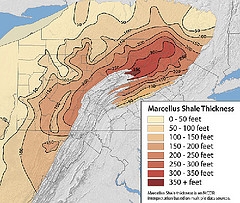
The Marcellus Shale formation deep underground -- and the natural gas it holds -- represents a huge economic engine for Pennsylvania.
UNIVERSITY PARK, Pa. — A series of Web-based seminars aimed at helping local businesses prosper from natural-gas drilling and development will be offered this fall by Penn State Extension’s Marcellus Educational Consortium.
“Your Business and Marcellus Shale: Moving Forward 2011” is a five-part program intended to help local businesses understand and take advantage of the opportunities arising from development of the Marcellus Shale.
“Participants will expand their knowledge of the opportunities that exist in the market and learn how to make connections and plan for doing business in this growing industry,” said Jonathan Laughner, extension educator in Beaver County who is moderating the sessions, one of which will be held every other week. Each webinar will feature speakers who are experts in the field.
“Our webinar speakers will include natural-gas industry representatives, local business people successfully responding to opportunities, financial specialists and business-development representatives,” Laughner said. “Anyone interested in learning more about this aspect of the industry is welcome to attend.”
Each session will last approximately 75 minutes, from 9 a.m. to 10:15 a.m. Following is the webinar schedule:
–Sept 13, “Local Business View: Experience in the Northeast”
–Sept. 26, “Industry View: What Does Industry Look For?”
–Oct. 11, “Local Business View: Experience in the Southwest”
–Oct. 24, “The Process: How Do You Sell Into Industry?”
–Nov. 8, “The Work Plan: Financial and Planning Suggestions”
This webinar series is for educational purposes only, Laughner cautioned. No part of the presentations is to be considered legal advice. “Please consult with your attorney before signing any legal document,” he said. “Where trade and/or company names appear, no discrimination is intended, and no endorsement by Penn State Cooperative Extension is implied.”
The website for the webinars is https://meeting.psu.edu/marcellusbiz. Webinar access requires a free Friends of Penn State account, which can be obtained at https://fps.psu.edu.
For more information, contact Carol Loveland, Penn State Extension energy development and special projects coordinator, at 570-433-3040 or by e-mail at cal24@psu.edu.
Aug. 25 webinar to examine effect of Marcellus gas activity on habitat
http://live.psu.edu/story/54504#nw69
Thursday, August 11, 2011
UNIVERSITY PARK, Pa. — As the Marcellus natural-gas boom has reverberated around Pennsylvania, residents and scientists alike have expressed concern about the impact extensive drilling and associated infrastructure development is having on wildlife habitat.
Wildlife managers and protectors are worried about forest fragmentation, the advance of invasive plant species and the effect the Marcellus play is having on activities such as hunting, fishing, bird watching and wildlife viewing.
There have been more than 2,350 wells drilled into the deep Marcellus formation under Pennsylvania in the last few years, primarily in the southwest, northeast and northcentral regions.
A Web-based seminar presented by Penn State Extension will offer a look at the latest information on the subject. Titled, “A Research Update on the Effects of Marcellus Shale Drilling on Wildlife Habitat,” the one-hour session will take place at 1 p.m. on Aug. 25.
“The webinar will cover landscape and habitat changes associated with Marcellus Shale exploration and development, and how that may affect Pennsylvania wildlife and wildlife-associated recreation,” said presenter Margaret Brittingham, professor of wildlife resources in the College of Agricultural Sciences.
“I will discuss research we recently have completed on shallow wells and give an overview of our current research project, which is looking at the effects of Marcellus Shale gas exploration and development on wildlife habitat in general and forest songbirds in particular.”
Pennsylvania contains internationally important breeding habitat for a number of neotropical migrant songbirds that — if degraded — would affect world populations, Brittingham noted. And much of the extensive gas development is occurring in the state’s northern tier, where some of the densest forests in North America provide ecologically vital bird habitat.
However, that new research is in its early phase, Brittingham explained. “We currently are collecting baseline data and determining whether there are any detectable changes at this stage of development,” she said.
“I will conclude the webinar by discussing habitat-restoration needs, guidelines and opportunities, both for minimizing potential problems and enhancing habitat quality.”
The webinar is part of a series of online workshops addressing opportunities and challenges related to the state’s Marcellus Shale gas boom. Information about how to register for the session is available on the webinar page of Penn State Extension’s natural-gas website at http://extension.psu.edu/naturalgas/webinars.
A webinar at 1 p.m. on Sept. 15 will focus on current legal issues in shale-gas development.
Previous webinars, publications and information on topics such as air pollution from gas development; the gas boom’s effect on landfills; water use and quality; zoning; gas-leasing considerations for landowners; implications for local communities; and gas pipelines and right-of-way issues also are available on the Penn State Extension natural-gas website (http://extension.psu.edu/naturalgas).
For more information about the webinar, contact John Turack, extension educator in Westmoreland County, at 724-837-1402 or by email at jdt15@psu.edu.
July 21 webinar to focus on natural gas pipelines
http://live.psu.edu/story/54077#nw69
Friday, July 8, 2011
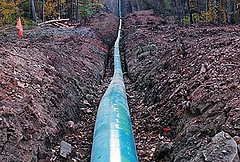
The type of pipeline -- whether it’s a gathering line or a much larger interstate transmission line -- determines how much surface disturbance takes place.
University Park, Pa. — A Web-based seminar to be presented by Penn State Extension July 21 will explore pipeline development and regulation in regions of the state being intensely affected by drilling for natural gas in the Marcellus Shale formation.
Speaking in the webinar will be Wayne County extension educator Dave Messersmith, based in Honesdale, who is part of Penn State’s Marcellus Education Team and coordinates the university’s annual Marcellus Summit, and Paul Metro, chief of the Gas Safety Division of the Pennsylvania Public Utility Commission.
They will discuss pipeline construction, associated surface infrastructure (valves, compressor stations, etc.), pipeline impacts on the landscape and in communities, ways to reduce pipeline impacts, negotiating terms for a pipeline right-of-way and regulatory oversight of gas pipelines in Pennsylvania.
There have been more than 2,300 wells drilled into the deep Marcellus layer in Pennsylvania in the last few years, primarily in the southwest, northeast and northcentral regions. Many pipelines have been and are being built to get the large volume of gas they produce to consumers.
A pipeline right-of-way is a strip of land over and around natural gas pipelines where some of the property owner’s legal rights have been granted to a pipeline operator, Messersmith said. A right-of-way agreement between the pipeline company and the property owner is also called an easement, which is usually filed in the county Register and Recorders Office with property deeds.
“Many people are concerned about eminent domain as it relates to pipelines,” he said. “In reality the type of pipeline — whether it’s a gathering line or an interstate transmission line — will determine who provides regulatory oversight and whether eminent domain is possible.”
Penn State Extension offers a publication called “Negotiating Pipeline Rights-of-Way in Pennsylvania,” which Messersmith authored, for people interested in knowing more about pipeline issues. Part of the Marcellus Fact Sheet Series, single copies can be obtained free of charge by Pennsylvania residents through county Penn State Extension offices, or by contacting the College of Agricultural Sciences Publications Distribution Center at 814-865-6713 or AgPubsDist@psu.edu. The publication also is available in digital format at http://pubs.cas.psu.edu/FreePubs/PDFs/ua465.pdf online.
The July 21 webinar is part of a series of online workshops addressing opportunities and challenges related to the state’s Marcellus Shale gas boom. Information about how to register for the webinar is available on the webinar page of Penn State Extension’s natural-gas website at http://extension.psu.edu/naturalgas/webinars online.
Future webinars will focus on a research update on the effects of shale drilling on wildlife habitat and current legal issues in shale-gas development.
Previous webinars, publications and information on topics such as air pollution from gas development, the gas boom’s effect on landfills, water use and quality, zoning, gas-leasing considerations for landowners, and implications for local communities also are available on the Penn State Extension natural-gas website, at http://extension.psu.edu/naturalgas online.
For more information, contact John Turack, extension educator in Westmoreland County, at 724-837-1402 or jdt15@psu.edu.
May 19 webinar explores impacts of natural gas industry on landfills
http://live.psu.edu/story/53255#nw69
Thursday, May 5, 2011

The Marcellus natural gas boom has generated business for landfills, but it has also presented challenges.
University Park, Pa. – Landfills in the region affected by the Marcellus Shale natural-gas boom have seen sharply higher revenues and felt more than a few headaches, according to solid waste experts.
“The Marcellus play has been good for the landfill business,” said Jay Alexander, general manager of the Wayne Township Landfill and a member of the Clinton County Solid Waste Authority. “But there is no question that it has brought pros and cons.”
Alexander and Larry Shilling, regional vice president of Casella Waste Systems, will be featured speakers during a Web-based seminar on May 19, presented by Penn State Extension. Titled, “The Impacts of the Natural Gas Industry on Landfill Operations,” the webinar will start at 1 p.m.
Shilling noted that Casella, which operates 10 landfills — including three in New York located in the Marcellus play and the McKean County landfill in Pennsylvania — is trying to come to grips with the challenges associated with solid wastes generated by the Marcellus Shale gas industry.
“Our company has commissioned two studies regarding oil and gas waste as it relates to landfills,” he said. “The first was an evaluation of the radiological characteristics of Marcellus drill cuttings; the second was a modeling effort to predict radiological impacts to leachate from a landfill that accepts drill cuttings.”
Shilling added that his presentation in the webinar will focus on the results of those two studies. “Our important role in the development of the Marcellus Shale natural-gas resource is to ensure we understand and manage the associated waste in the most appropriate manner,” he said.
The gas industry has brought new waste streams into the market, such as plant trash, drill cuttings and liquid wastes, Alexander said. “That has provided us with additional income, allowing us to move up landfill expansion plans, including updating $5 million worth of new equipment. And we were able to fund it all out of cash flow.”
Alexander noted that his company also has been able to purchase surrounding properties that were targeted for long-term growth of its landfill. “That’s all spending that puts money into local pockets by creating additional jobs,” he said.
“We have seen an increased workload for local hauling contractors, with six to eight of them working daily with our landfill, hauling waste for the gas industry. And with the increase in materials, we have seen the income for our recycling operations rise.”
But, Alexander said, with the added business and profit come a few negatives, which he will address during the webinar.
“We have to deal with and control greatly increased truck traffic, the added materials have reduced landfill gas production, we have increased leachate generation and we have additional odor concerns,” he said.
The May19 webinar is part of a series of online workshops addressing opportunities and challenges related to the state’s Marcellus Shale gas boom. Information about how to register for the webinar is available on the webinar page of Penn State Extension’s natural-gas website at http://extension.psu.edu/naturalgas/webinars online.
Future webinars will include speakers on the following topics: air quality issues related to unconventional gas plays; pipeline development and regulation; a research update on the effects of shale drilling on wildlife habitat; and current legal issues in shale-gas development.
Previous webinars, publications and information on topics such as water use and quality, zoning, gas-leasing considerations for landowners, and implications for local communities also are available at http://extension.psu.edu/naturalgas online.
For more information, contact John Turack, extension educator in Westmoreland County, at 724-837-1402 or jdt15@psu.edu
Webinar on Marcellus Shale natural-gas trends offered on April 21
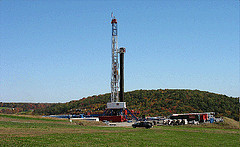
The webinar on April 21 will cover the latest trends in Marcellus shale gas-drillig leases, royalties and production.
UNIVERSITY PARK, Pa. — The latest trends in Marcellus Shale natural-gas leases, royalties and production will be discussed by experts in a Web-based seminar April 21, sponsored by Penn State Extension.
Les Greevy, of Greevy and Associates in Williamsport, Pa., and Kris Vanderman, of Vanderman Law in Charleroi, Pa. — both firms that specialize in representing clients with Marcellus Shale natural-gas interests — will make presentations in the webinar.
“We started with Extension in 2005-06, doing educational programs for landowners, and we represent many people with gas-drilling leases,” Greevy said. “We have been dealing with issues such as going from the lease stage to the production stage, estate planning, protecting assets and tax issues.
“A lot of leases are starting to run out, so we are starting a whole new cycle of leases. We’ll be discussing that, as well as pipeline-property issues and trends in contract addenda, royalty payments and cash-bonus payments.”
Greevy noted that business dealings with gas-drilling companies have changed somewhat in northcentral Pennsylvania. “The trend that we are seeing now in leasing is less competition between companies,” he said. “Previously you had any number of companies competing for leases and there was rapid growth in leasing.
“Now, the gas companies have pretty much staked out geographic areas that they’re interested in and are not competing quite as much, and as a result, prices are down a little, and the ability to get protective addenda in leases is diminished.”
Vanderman, whose firm represents only individuals and groups with land to lease — and never the gas-drilling companies — has seen the same kind of consolidation in leasing by the companies in the state’s southwestern corner. And he also has witnessed a similar resulting drop in lease payments to and leverage for landowners.
“Right now, there is an active swapping of leases between companies, and they are carving out their territories,” he said. “You have companies that are more or less dominant in areas,and this consolidation of territory by lease swaps or farm-out agreements is ongoing.”
Regarding the trend towards landowners having less ability to insert protective addenda into leases, Vanderman indicated that companies from out-of-state now appear less flexible than they had been when the Marcellus play was newer in Pennsylvania. However, in the southwest there are two “home” companies, EQT and CNX — the third, Atlas, was just aquired by Chevron — that help keep competition in play, which is helpful for some landowners depending on geography.
“I can say unequivocally the hand of Texas is revealed,” he said. “Some of the newest ‘standard offer’ leases are extraordinarily — even dramatically — favorable to the interests of the lessee gas companies. The issue here is, what is a landowner willing to concede for money?”
Vanderman noted that, during the webinar, he intends to also talk about environmental progress that has been made voluntarily by operators in the southwest part of the state. “That includes on-site water-treatment systems that have been implemented, recycling of flowback water from fracking operations and installation of underground water-piping systems to remove truck traffic from the roads,” he said.
The webinar is part of a series of workshops and events addressing circumstances related to the state’s Marcellus Shale gas boom. Information about how to register for the webinar is available on the webinar page of Penn State Extension’s natural-gas website.
< http://extension.psu.edu/naturalgas >
Future webinars will include speakers on the following topics: the impacts of the natural-gas industry on landfill operations; air quality issues related to unconventional gas plays; a research update on the effects of Marcellus Shale drilling on wildlife habitat; and current legal issues in Marcellus Shale development.
Previous webinars, publications and information on topics such as water use and quality, zoning, gas-leasing considerations for landowners and implications for local communities also are available on the Extension natural-gas website.
For more information, contact John Turack, extension educator in Westmoreland County, at 724-837-1402 or jdt15@psu.edu.
Friday, April 8, 2011
http://live.psu.edu/story/52684#nw69

